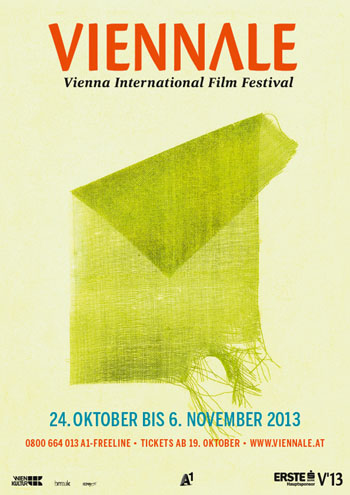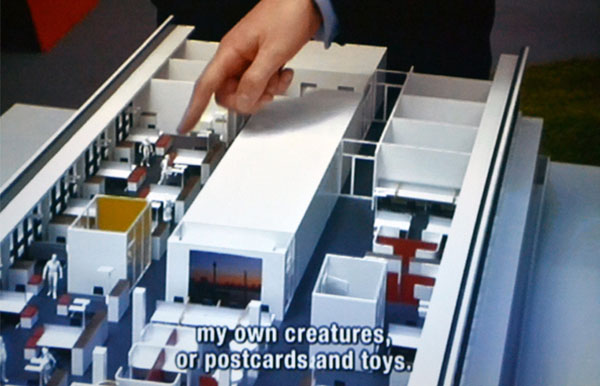This year’s Viennale opened on October 24 and runs through Wednesday. The first item to highlight has to be Jonathan Rosenbaum‘s text for the catalog accompanying the Jerry Lewis retrospective, a joint project of the festival and the Austrian Film Museum, where the series will carry on through November 24. As the Museum’s Alexander Horwath notes, it “represents the first attempt in decades to stage an extensive overview of Lewis’s work as actor and director, in 35mm prints only.” For Jonathan Rosenbaum, “it’s hard to think of anyone else apart from Lewis in which there’s such a huge disparity between his or her mainstream and avant-garde profiles.”
“Especially in the films directed by Lewis but even in his solo outings directed by cinema’s great live action cartoonist Frank Tashlin,” writes Notebook editor Daniel Kasman, “we find comedy verging on chaotic uncontainability, of unmotivated mania, of the uncontrolled and uncontrollable… Yet it bares pointing out that these very characteristics Lewis also channels into a profound sweetness, of an overly-human (superhuman, even) vulnerability, of the magic of innocent-childish thinking, and of a wondrous adulthood as instantaneous as snapping one’s fingers; in short, channeled into a profound humanism that exists simultaneously within the same body which expresses and inspires so much craziness.”
Danny’s Viennale report runs wide and deep, covering, among other works, Christoph Girardet and Matthias Müller’s short film Cut, which “reveals a trans-filmic obsession with, and secret narrative of, bodily destruction,” and Raya Martin and Mark Peranson’s La última película before wrapping with lengthier considerations of Joshua Oppenheimer’s “extraordinary, repulsive, flabbergasting, and completely engrossing work of quasi-documentary, The Act of Killing, and Harun Farocki’s A New Product, “a corporate documentary” that’s “practically indistinguishable from an ostensibly sympathetic, commissioned film revealing the brilliant newfound techniques to assuage alienation and integrate contemporary non-work environments (the gym, Starbucks) directly into the corporate workplace.”
Also in the Notebook, Michael Pattison writes about “Cuban-born Nicolás Guillén Landrián (1938-2003), whose short films seem to embody the properties of guerrilla warfare itself—or more precisely, the guerrilla warfare by which Batista’s Cuban dictatorship was overthrown in the 1950s. The six Guillén Landrián shorts programmed by the Viennale this year, all made between 1964 and 1968, were conditioned by and actively responded to the multiple contradictions that characterized working life in Cuba in the decade following its revolution.”
Michael Pattison‘s also dispatched to the House Next Door, sending in impressions of Thomas Arslan’s Gold, Denis Côté‘s Vic + Flo Saw a Bear, J.P. Sniadecki’s Demolition, Peter Hutton’s Three Landscapes, and Hong Sang-soo’s Our Sunhi.
International Trailer: October November.
At Twitch, Patrick Holzapfel finds Götz Spielmann‘s October November a bit of a letdown after Revanche (2008). When it screened in Toronto, Variety‘s Justin Chang called it “a carefully constructed and beautifully acted tale of two very different sisters brought together when their aging father falls seriously ill. Old resentments resurface and long-kept secrets are duly excavated, but in a measured, compassionate manner that yields a persuasive and nuanced portrait of broken but not irreparable family ties.”
“Actress Nora von Waldstatten, who plays an attention-craving star living the high life in Berlin, and Ursula Strauss, as her older sibling who stayed behind in rural Austria to look after their father, both give firecracker performances that bristle with jealousy and resentment as well as sisterly love,” wrote Boyd van Hoeij in the Hollywood Reporter, “and the duo more than do justice to Spielmann’s complex if never convoluted screenplay.” More from Anna Obererlacher (Twitch) and Christopher Schobert (Playlist, C+).
Update, 11/5: For Indiewire, David D’Arcy talks with Viennale director Hans Hurch and Austrian Film Museum director Alexander Horwath about Jerry Lewis—and offers his own impressions of the retrospective.
Updates, 11/7: Another round of new reviews from Michael Pattison at the House Next Door: Tsai Ming-liang’s “emotionally and intellectually engaging” Stray Dogs, Gonzalo García Pelayo’s Joys of Cádiz (“like a DVD feature on rehearsals for (or outtakes from) the most melodramatic of soap operas”), Martin and Peranson’s La última película, Alberto Gracia’s “egregious” The Fifth Gospel of Kaspar Hauser, Juan Barrero’s La Jungla Interior (The Inner Jungle; takes “self-indulgence to new levels”), Christina Koutsospyrou and Aran Hughes’s Sto Lyko, Shaina Anand and Ashok Sukumaran’s From Gulf to Gulf to Gulf, and Stephanie Spray and Pacho Velez’s Manakamana. Oh, and “the most unique ‘screening’ at the Viennale this year wasn’t a screening at all: Karel’s Swiss Mountain Transport Systems, a stereo recording spatialized especially for the festival’s Metro Cinema venue, which played in a darkened auditorium with a deep, evocative purr.”
“Spanish director Juan Barrero’s first feature film The Inner Jungle is an apparently autobiographical film completely shot from the point of view of the director and featuring practically only one other character.” A review from Vladan Petkovic at Cineuropa.
Also, Martin Kudláč reviews My Dog Killer, “a sophomore feature by young director Mira Fornay, [which] marks another bleak drama in Slovak cinema,” and Medeas: Andrea Pallaoro’s “chilling observational drama peel layers of family and personal fortification until the bitter bare existential dead end.”
Update, 11/11: A sampling from Eithne O’Neill‘s report for FIPRESCI: “Among the international competing titles, The Reunion (Ǻterträffen), a polished Swedish first, in which Anna Odell the filmmaker plays the main part, differed from other competitors in its middle-class milieu. Bittersweet, with a clever formal twist, this is a wry variation on the theme of embarrassing guests with the truth about themselves. Film buffs caught up with Mouton, a new jewel by the French duo Marianne Pistone and Gilles Deroo, or with the more post-modern Brazilian Avanti Populo by Michael Wahrmann, an elegy to a brother who vanished under military rule.”
Update, 11/20: “One of the strongest works to date from the [Sensory Ethnography Lab] is J.P. Sniadecki’s Demolition (Chaiqian, 2008),” writes Michael Pattison for Sight & Sound. “Filmed in Chengdu, the capital of China’s Sichuan Province, in July 2007, this observational film documents life on a rubble heap as experienced by itinerary workers.” Also reviewed are Dominique Benicheti’s Le Cousin Jules, “which won a prize upon its 1973 world premiere in Locarno,” and Peter Hutton’s Three Landscapes, “perhaps the most remarkable film at the Viennale this year.”
Update, 12/1: Yun-hua Chen looks back on this year’s edition for Film International.
For news and tips throughout the day every day, follow @KeyframeDaily on Twitter and/or the RSS feed. Get Keyframe Daily in your inbox by signing in at fandor.com/daily.





